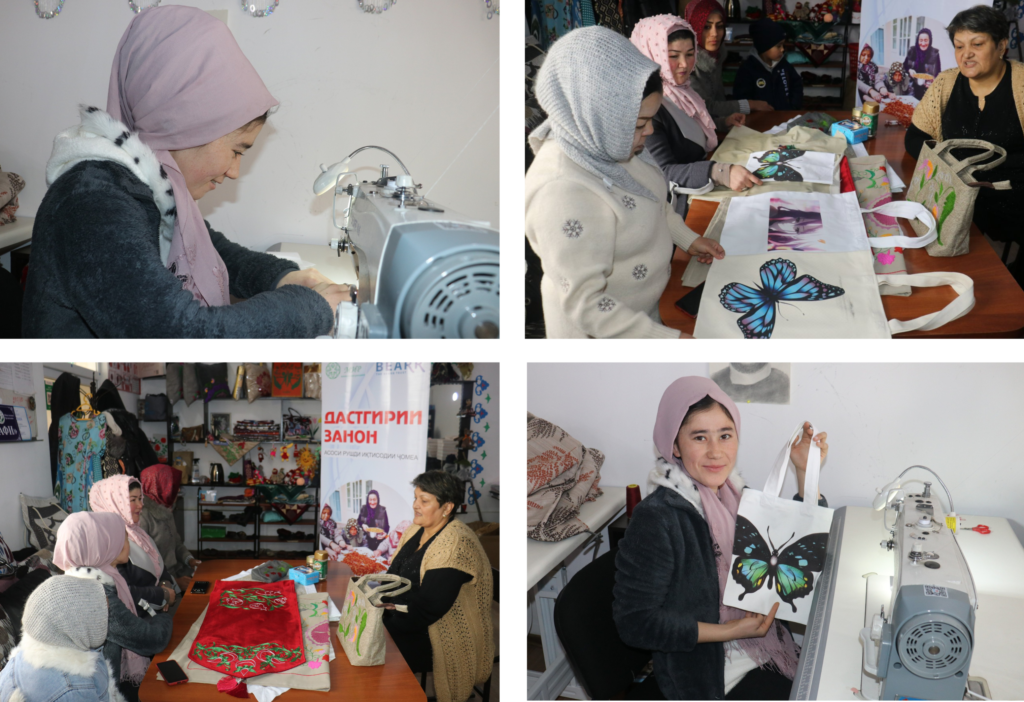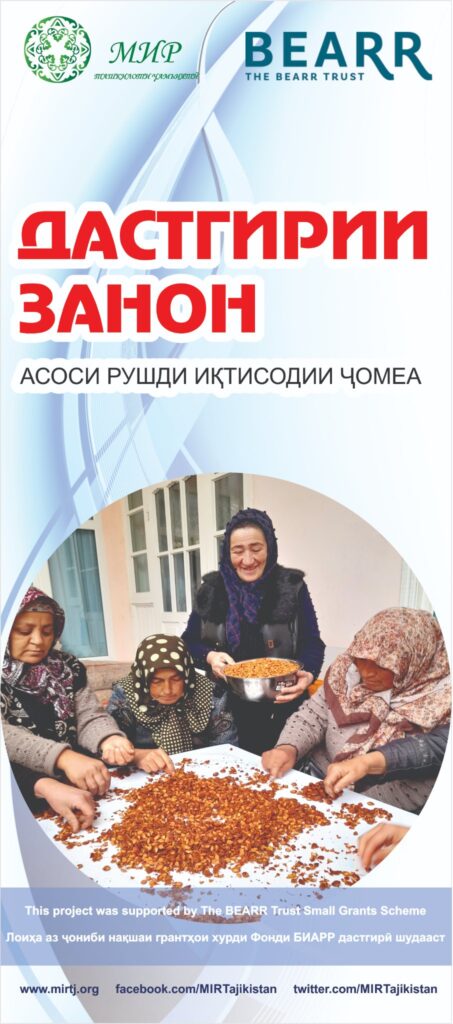Project report: MIR, Tajikistan
Grantee: Public Organization “MIR – Office for Initiatives Development”, Tajikistan
Project: “Financial literacy: the key to the economic well-being of families of labour migrants”

Labour migration is of great importance to the economy of Tajikistan and to maintaining the well-being of the population. The economic crisis in the world and the resulting contraction of the Russian labour market, which employs many Tajik migrants, has created new difficulties for both migrants and their families.
A significant reduction in the amount of money transferred by migrants to their homeland, as well as the return of some migrants to local labour markets, the capacity of which is limited, have become new challenges for rural regions of Tajikistan. According to the World Bank, an increase in the overall level of poverty in Tajikistan should be expected: after all, poor households in Tajikistan are much more dependent on remittances than wealthier ones. More than 80% of households receiving remittances from relatives from labour migration note that they mainly spend the money on food and other essentials.
Our project was implemented in Isfara, where a large number of men leave for Russia. Their wives and children who remain in Tajikistan mostly live only off money transfers from their relatives who left to work in Russia.
At the same time, Isfara is one of the regions where women face gender stereotypes – the issues of completing school and continuing education at university, employment, and participation in social events are decided by the male member of the family. As a result, the family of labour migrants who stayed at home, because of their lack of financial education, cannot properly plan the family budget or spend the funds received from remittances. Those women and girls who have a desire to engage in entrepreneurial or income-generating activities do not have sufficient knowledge, skills, and experience.
While migration often offers opportunities, it can also lead to great hardship, especially for children and families left behind.
Mark Buchmann, Head of Cooperation of the European Union in Tajikistan
Given these new challenges for women, the project carried out activities to transfer knowledge to 40 women and girls from families of labour migrants in Isfara, Sughd region, on financial literacy, strengthening entrepreneurial skills, and creating small income-generating activities through mentoring and support from women entrepreneurs.
During the training sessions, the participants gained skills in managing money sent from labour migration by their families and family budgeting, began to actively use mobile banking applications and use e-wallets.

Financial literacy training
“Participation in the financial literacy training gave me the opportunity to learn how to manage my finances, how to allocate my budget and use money rationally. This knowledge is already helping me in managing my family’s expenses and income, and as taught me how to allocate money not only for food, but also for my work.
Faizulloeva Mudassirakhon, 21 years old, Isfara
A significant part of the project was master classes that allowed the project participants to improve their professional skills. During these classes, experienced mentors helped the girls to learn the features of sewing, baking pastries and processing dried fruits, and develop income-generating activities at home.
“As a seamstress, I really enjoy creating beautiful pieces. While participating in this master class, I learned what is in demand nowadays. Now I know how to sew a tote bag properly, I know how to design it. This gave me the opportunity to expand my product range and satisfy my customers.”
Murtazoeva Karomatkhon, 22 years old, Isfara

Sewing classes
Considering the economic situation in the participants’ families, the project provided technical support in the form of equipment to groups of women who came together to work and create income-generating activities. Providing technical support and mentorship from successful entrepreneurs in Isfara allowed the project participants to apply the acquired knowledge throughout the project and start earning money.
During their participation in the project, they made friends with each other and with their mentors, which gives them strength. They know that now they have support, they have learned to manage their financial resources, spend the family budget economically, have acquired new skills that allowed them to start working and earn money. Munira (name was changed by participant’s request), suffered from severe depression just a year ago. Her husband stopped sending money and, with four small children, she was forced to take on seasonal field work to buy food. She had no education, no job, and no support.
“… I was in despair, going out to the field, leaving the children alone at home,” she recalls. “When I was a child, my mother taught me to sew and knit. Participation in the project gave me new strength. I found people who could not only empathise but also teach me to ‘live’. Now, with other members, I take orders to sew bed linen, aprons, kitchen gloves, and I do all this at home.”
Munira A., 28 years old, Isfara

Organisation contact details:
Address: Republic of Tajikistan, Sughd region, Khujand, Sevastopol str., State Institution “Stadium of the 20th anniversary of the Independence of Tajikistan”, 735700
Email: po.mir.tajikistan@gmail.com
Telephone: +992 92 787 8558
Facebook
Author contact details
Iroda Bobojonova , Chairperson of PO MIR
Email: po.mir.tajikistan@gmail.com
Photos by Azizakhon Nozimova and Sanovbar Nosirova